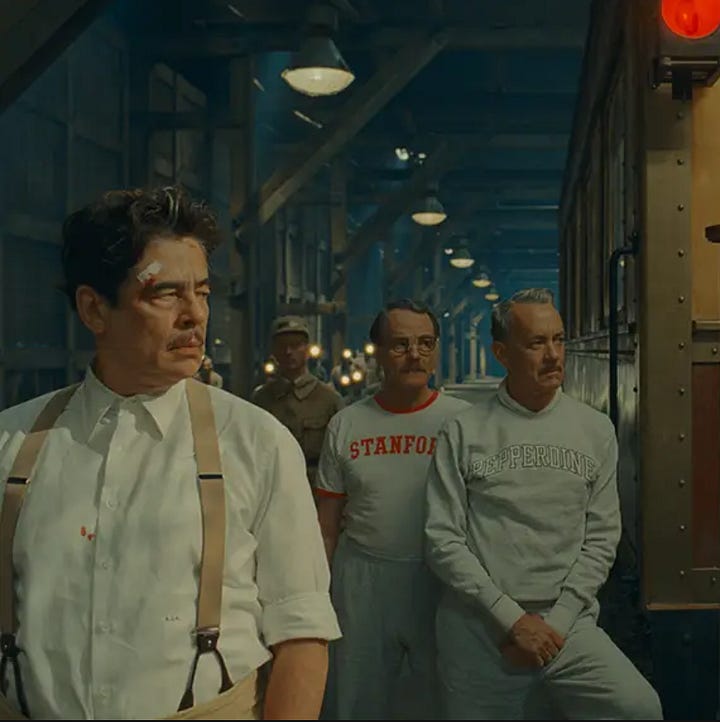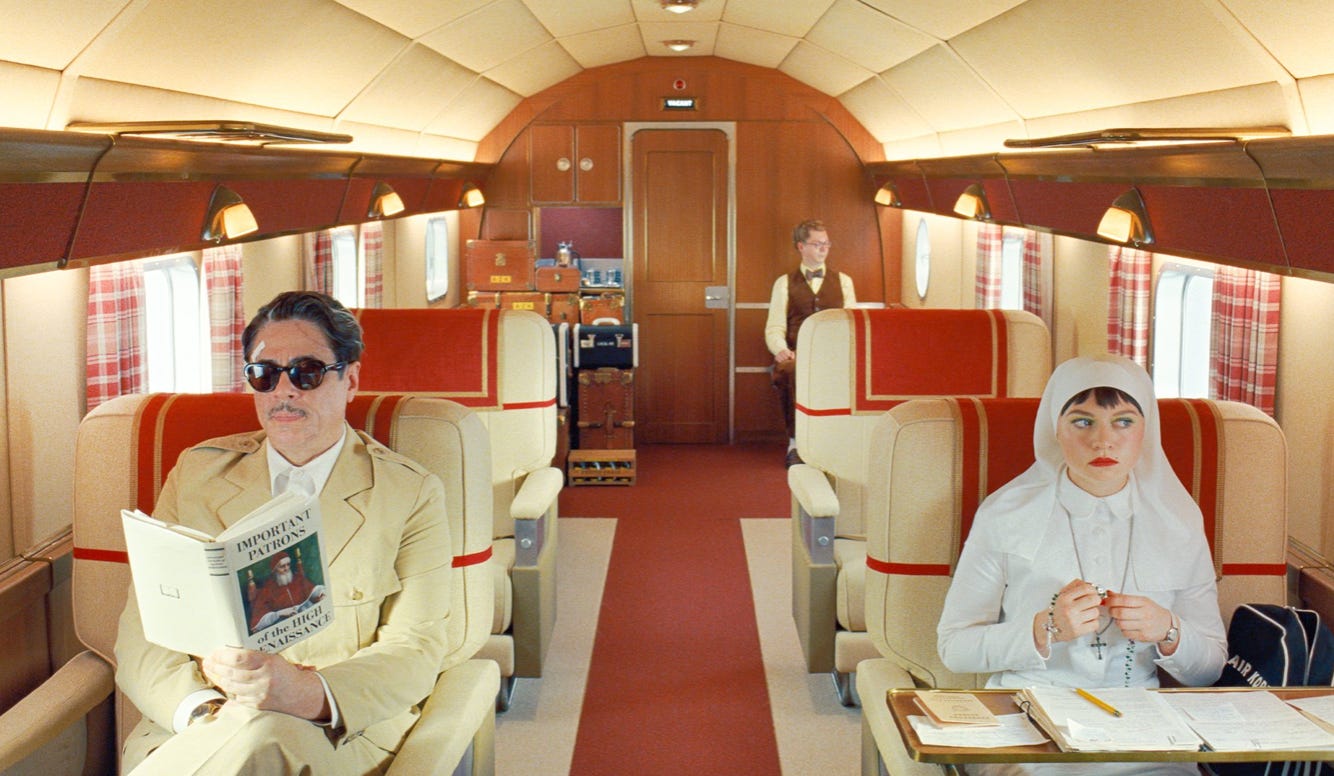Once again, I join the estimable
for a movie review (See our previous review of Coppola’s misunderstood masterpiece: Everyone is Wrong About Megalopolis). Alex writes a terrific Substack, , and I encourage you to check it out. He recently released a cinema-related essay about Letterboxd, exploring thoughts on judgement, taste, and Ryan Coogler’s Sinners.Part One
By Carter Davis Johnson
Wes Anderson’s The Phoenician Scheme is masterful. It’s a quirky comedy that unfolds on meticulously arranged sets with a plot explained in fast-paced and intricate dialogue. There are strong performances throughout; Michael Cera is simply delightful. I won’t give an entire plot summary, but in short: A corrupt tycoon makes his estranged daughter (who is about to take orders as a nun) his heir; they go on a series of adventures and reconcile by the end of the film. The movie is optimistic, and it’s themes are life-affirming: relationships are more important than money; change is possible; family is complicated but indispensable.
And yet, I felt that film’s themes never reached maturity. They somehow kept receding, interrupted by comedic bits (which were often laugh-out-loud-funny) and a fixation on the mise-en-scène’s tactile elements (which were lovely). In my mind, there were two major attributes that seemed to stunt the thematic growth.
First, the plot occasionally felt unimportant; or better said, it lacked a poignant sense of stakes. Brian Tellerico captured this sentiment in his review published in Robert Ebert: “The plotting often feels like an arbitrarily structured skeleton on which Anderson and co-writer Roman Coppola hang the things that interest them.” His review softens by the end, but the central sentiment of “arbitrary” remains relevant. One could have switched out the “adventure” and maintained all the father-daughter dynamics. It’s difficult to make the stakes feel high in any comedy, and this film doesn’t quite surmount the challenge.
Second, although the film centered on interpersonal relationships, it lacked the sharp “humanness” of Anderson’s earlier oeurve. For instance, in Life Aquatic, we likewise encounter a parent-child-reconciliation story.1 And yet, that comedy draws us much closer to its heart. The relationship between Zissou (Bill Murray) and Ned (Owen Wilson) is genuinely moving. I didn’t feel that here. I felt almost separated from the main characters. Dana Stevens of Slate writes, “For all its exquisite boxes-within-boxes compositions and cleverly designed sets, this whole movie unfolded for me as if behind a thick pane of emotion-proof glass.” Although this is a little harsh, the metaphor of emotion-proof glass feels accurate.
Perhaps Anderson’s vignette style in recent films detracts from the emotional unity that his earlier work enjoyed. Or, maybe the stiffness of the dialogue (which can be really fantastic) has grown too stiff. There is something off. For example, Zsa-zsa is world’s away from Royal Tenneuambaum, another estranged father from Anderson’s cinematic world.


Royal maintains the same selfishness, but his character is decidedly closer to the audience. We feel his redemption, especially in the final scene at the graveyard. Zsa-zsa’s redemption, however, is more distant. His character is largely inaccessible; he constantly thwarts death, never shows facial expressions, never breaks down emotionally, etc. Although these are different characters in different movies with different constraints, I think the contrast is telling.
The Phoenician Scheme feels like a zenith of sorts, a high point of Anderson’s highly curated style. He seems to have taken this form as far as it goes. Although I’ll gladly watch another iteration, I can’t help but wonder if it’s time to pull a Bob Dylan. I’m ready for something completely unexpected. Let’s say an action flick with Tom Cruise or a serious drama with Daniel Day Lewis. Throw people a curveball. I’m ready for Wes Anderson to go electric.
Part 2
By
Carter is right.
The Phoenician Scheme is something of a zenith for Wes Anderson. For me, it ranks among his funniest films. It’s kind, whimsical, beautifully shot, well-acted, and thematically interesting. I’m always so impressed with Anderson’s ability to corral a cast––itself a huge feat. Giving Bill Murray 75 seconds of screen time, Willem Dafoe 90 seconds, Bryan Cranston 120 seconds––this is a form of artistic restraint I wish I could emulate in my own writing.
I’ve spent the last week ruminating on this lovely movie and considering it alongside Anderson’s best cinematic moments. Despite its competence, there’s a clear tension at play here (hinted at by Carter) when we consider this movie in view of Anderson’s career at large, and I want to pose it in the form of a question:
Can you have too much of a good thing?
One of the more popular refrains online seems to be, for example, that the director has officially become a “parody of himself.” He’s too stuck in the mire of his own style. He’s played himself out. He’s jumped the shark. Doesn’t this guy get tired of deadpan line deliveries, pastels, planimetric sets, understatement?
The obvious answer is no––I am not sure he will ever leave these behind––but that’s beside the point. Remember that our question is: Do these elements of Anderson’s style and his reliance on certain filmic motifs, abundant as they are across his work, mean that the quality of his films has gone down over time? Is it time for him to call it quits and go electric?
Let’s take a small diversion.
Ever since he entered the NBA in 2016, Nikola Jokić––the 6 foot 11, Serbian-born center for the Denver Nuggets––has been an absolute phenom. He gets rebounds, plays solid defense, passes the rock like a beast, and shoots the 3 ball as a big man in a way that nearly defies logic. He cemented his superstar status when he won back-to-back NBA Most Valuable Player awards in 2021 and 2022.
And in 2023––a year in which he improved his stats from the previous season––Jokić was slated to win MVP again, a triple crown in sight.
But he didn’t. And he didn’t win (76ers center Joel Embiid did) because voters got tired of him. They grew bored, apathetic, numb. For no other reason than because they craved originality, the critics failed to notice or be impressed by the astonishing product before their eyes. They were being served premier, record-breaking, once-in-a-lifetime level sporting mastery on a silver platter.


This is often called “voter fatigue,” and it’s discussed in sports circles when the viewing or voting audience has grown complacent.
I think we are seeing “viewer fatigue” with Anderson. Like the writers and journalists tasked with picking MVP, are we simply being spoiled by greatness?
Perhaps the criticism being lobbed Anderson’s way is nothing but an unmerited craving for newness, taking for granted the real product before our eyes––a unique type of cinema chiseled and polished like a fine marble sculpture. Is it such a bad thing that his movies feel so similar, when the results are so inviting and carefully crafted?
For me, Wes Anderson films will always be like a Jokić bucket from deep. A long, well-practiced, insane, but beautiful 3-pointer.
That rip of the net never really gets old.
Might I add that in both movies the parent turns out not to be the biological parent. Do with that what you will…






